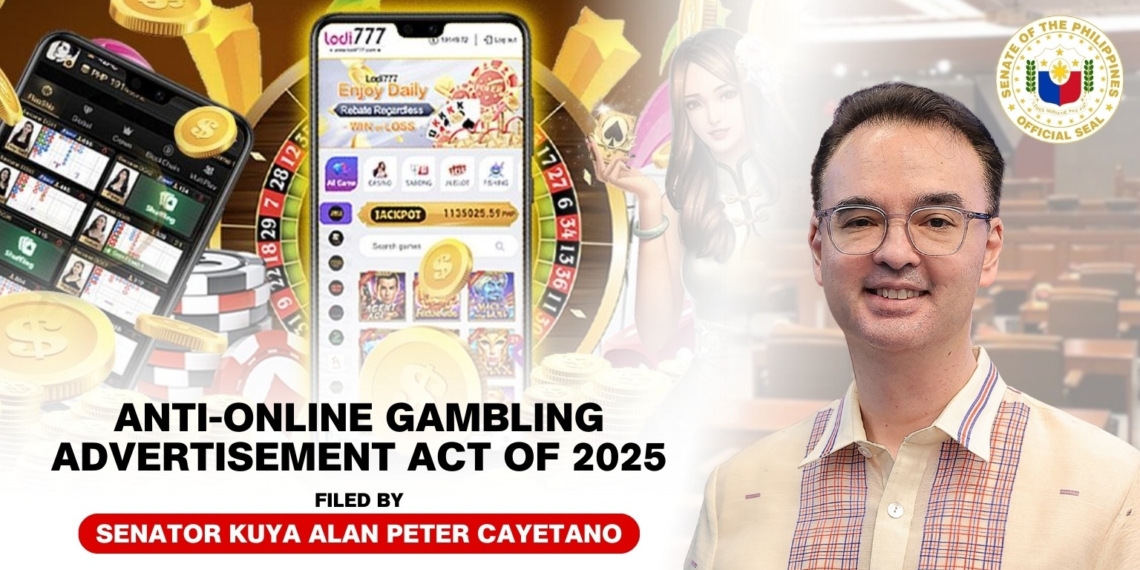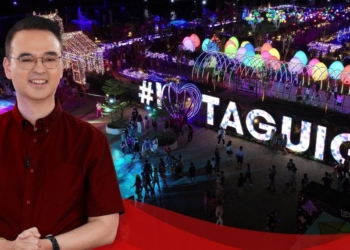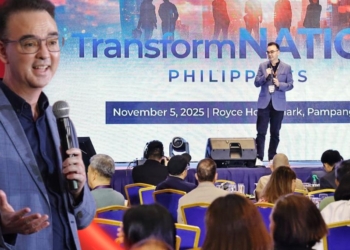In a move to protect the public from the devastating effects of digital betting platforms, Senator Alan Peter Cayetano has filed the Anti-Online Gambling Advertisement Act of 2025 which aims to ban all forms of advertising, marketing, and promotion of online gambling in the Philippines.
Cayetano has repeatedly warned that aggressive promotion – especially online – normalizes gambling and fuels addiction, leading to financial distress, broken families, and mental health issues.
While he is simultaneously pushing for a total ban on online gambling this 20th Congress through the Ban on Online Gambling Act – a measure he filed on June 30, 2025 with Senator Pia Cayetano, he sees the Anti-Online Gambling Advertisement Act of 2025 as a crucial first step.
Cayetano has long been at the forefront of the fight against online gambling. In 2000, he filed an Act Prohibiting All Forms of Gambling thereby repealing the laws that created the Philippine Charity Sweepstakes Office (PCSO) and the Philippine Amusement and Gaming Corporation (PAGCOR) and revoking their respective Congressional franchises.
His campaign intensified with the disappearance of 34 cockfighters in 2021 which highlighted the dangers of e-sabong.
The senator had also previously filed the Anti-Online Gambling Act in the 19th Congress and continues to push for stricter regulations.
“Gambling can lead to serious harms on individuals, families, and societies, including financial distress, relationship breakdowns, family violence, mental illnesses and even suicides. With the advent of the internet and online platforms, gambling has never been easier and more accessible to more and more people,” Cayetano said in the measure filed on July 3, 2025.
The urgency of the measure is underscored by the rapid growth of online gambling, which now accounts for over half of Philippine Games and Amusement Corporation (PAGCOR)’s 2024 earnings, surpassing traditional casinos in revenue.
“As part of our persistent push toward a total ban on online gambling, we start with cutting off its oxygen – advertising. A population-wide public health approach is required to address this situation, which includes the ending of online gambling advertising,” Cayetano said.
Just weeks before the 20th Congress convened this month, he called for continued scrutiny of the industry, noting that domestic online gambling continues to thrive despite the ban on Philippine Offshore Gaming Operators (POGOs).
“Ang problema, ipinagbawal na natin ang POGO pero lumalaki naman po ang online industry na puro mga Pilipino ang tumataya. I hope the next Congress can look into this,” Cayetano said during the June 11, 2025 plenary session.
Under the proposed bill, all forms of online gambling advertisements across mass media such as TV, radio, internet, social media, print, and outdoor platforms are prohibited, including company sponsorship of sports, concerts, and cultural events.
Licensed platforms may advertise only on their websites, with PAGCOR approval and under strict guidelines such as age warnings and a ban on misleading claims.
Violators face up to six years in prison or fines up to P5 million. For corporations, key officers may be held liable and receive the maximum penalty.
Public officials face harsher penalties, including dismissal and disqualification from public office.
Cayetano stressed that the bill is not just about regulation but about protecting future generations from the harmful effects of gambling.
“At the end of the day, it is our moral obligation to prevent the disintegration of our values as a people… to protect future generations from the evils and dangers of not only gambling and greed, but also the proliferation of messaging that inevitably downplays such dangers and promotes its consumption,” Cayetano said.






